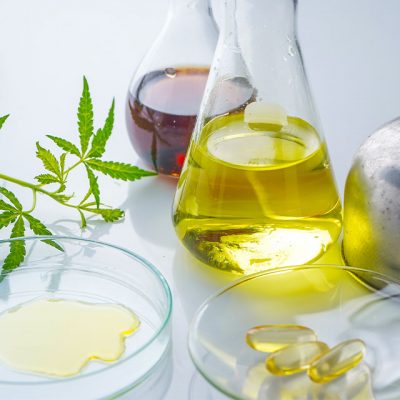I’ve been in the health and wellness industry for about two decades, and I’ll be the first to admit that some of the information that you come across can feel really murky. Like black-water pond murky. Like you-don’t-know-what-to-do murky.
That’s because sometimes the information is confusing. Sometimes it’s conflicting. Or sometimes the subject is so new—and not yet studied fully—that it’s hard to break through and understand what it all means.
And the danger with that murkiness is that you make decisions based on virtually no information, rather than making informed choices about what’s best for you.
One of my missions is to help clear up the confusion, so you can better understand the information—especially when it comes to things that are at the top of your mind.
Right now, one of the biggest phrases in the wellness industry is CBD (which stands for cannabidiol, an oil extracted from Cannabis sativa, a species of plant). It’s been shown to have a positive effect on sleep, mood, pain, and more. And it certainly is also associated with the more common phrase of cannabis.
Here, I’ll take you through some of the common questions I get about CBD, so you can learn about the various kinds of CBD products.
What are the different ways to use CBD?
CBD can be taken orally by placing it under the tongue, allowing it to dissolve and be absorbed, or ingested in capsules and edibles. CBD can also be added to ointments and lotions for topical use or inhaled using a vaporizer. The method of ingestion plays a significant role in how quickly CBD enters the system, with vaporizing being the quickest and most efficient. It can be used via tinctures, liquid concentrates, powders, capsules, edibles, beverages, vape oil, lotions, and salves.
What’s the difference between hemp, marijuana, and CBD?
Hemp vs. Marijuana: Hemp is grown and cultivated for fiber and seed to produce a variety of products, including foods, oils, rope, and fabrics. Marijuana is cultivated to yield high levels of the psychoactive ingredient THC, concentrated heavily in the flowers and buds. Marijuana is bred to have THC levels that can exceed 20%, as opposed to hemp, which has less than .3% THC and no psychoactive properties.
CBD: Nearly-pure CBD is isolated from the other cannabinoids found in hemp oil. Hemp oil is extracted from the stalks and stems of cannabis using a chemical process and contains the full range of cannabinoids found in the plant. Oil may be obtained using solvents or with a non-toxic and non-flammable CO2 extraction method. Prevalent in the food industry and “generally regarded as safe” by the FDA, CO2 extraction eliminates the risk of solvent residues in the final product.
What are the different kinds of CBD products?
Full Spectrum CBD
Full spectrum (or “whole plant”) products contain CBD as well as terpenes (the oils that give cannabis its smell) and other cannabinoids such as CBG, CBN and trace amounts of THC. Usually these will be in ratios that were naturally occurring and extracted from the plant and specific strain. Terpenes and cannabinoids are occasionally added back into products as an isolated form to raise the potency of the product.
Full spectrum products are by far the most popular. With full spectrum CBD oil products, you have the advantage of something called the “entourage effect.” This is where all the cannabinoids and terpenes are working together in synergy, something that broad spectrum and isolate products will lack.
Those subject to drug testing should be cautious when it comes to full spectrum products. The THC found in full spectrum hemp oil products is minimal (less than 0.3%), but can still trigger a positive drug test.
Broad Spectrum CBD
Broad spectrum products contain an array of cannabinoids and terpenes but zero THC based on the manufacturer’s lab testing. Third-party lab reports that are readily available from reputable companies can tell you which cannabinoids and terpenes are in the product and at what levels.
These products have often gone through additional processing to try to isolate and remove as much THC as possible while still maintaining the other cannabinoids and terpenes. In other cases, they are isolate-based with additional cannabinoids and terpenes added in.
Isolate
Isolates are typically the CBD oil product of choice for those who get drug tested or are sensitive to other cannabinoids such as THC. Products labeled as isolates will generally be highlighted as being 99+% “pure CBD.” Usually, these products will have nothing but CBD in them because the CBD has literally been isolated from everything else. You can find pre-made isolate oils that typically consist of a carrier oil, such as MCT oil, infused with the crystalline isolate powder. You can also find the “raw” CBD crystalline powder or slabs (a form of concentrate) on its own.
When looking at isolate, it is important to verify the purity. While many are in the 99.9+% range with no identifiable amounts of THC, there are lower purity ones (such as 99.5% or lower) that may still have trace amounts that show up on the labs. This small amount is typically negligible, and is nowhere near the amount usually found in full spectrum products. But it’s still something to be aware of for those seeking the purest they can find.
Terpsolate:
This is the crystalline isolate infused with terpenes. These products can give you a bit of an enhanced effect over just CBD isolate on its own depending on the terpenes that have been used.
Is it better to use Full Spectrum, Broad Spectrum, or Isolate?
While there is much debate on which form is better, I like full spectrum CBD products. because of the “entourage effect.” Ultimately, however, we are all different and it comes down to the individual user and their needs. If drug testing is a concern, you’re encouraged to seek out CBD isolate products (or terpsolates) or broad spectrum products instead of full spectrum.





